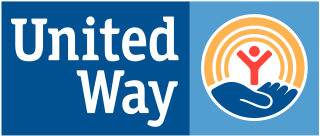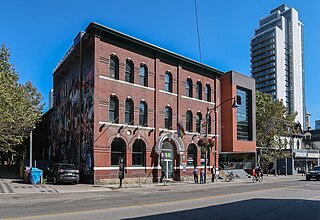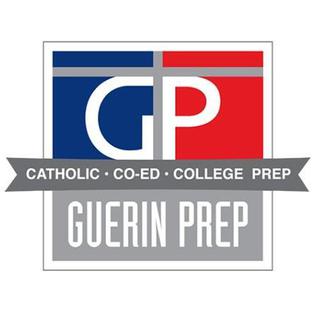Related Research Articles

United Way is an international network of over 1,800 local nonprofit fundraising affiliates. Prior to 2015, United Way was the largest nonprofit organization in the United States by donations from the public. Individual United Ways mobilize a single fundraising campaign to raise money for various nonprofits, with most donations coming through payroll deductions.

The White House Office of Faith-Based and Neighborhood Partnerships, formerly the White House Office of Faith-Based and Community Initiatives (OFBCI) is an office within the White House Office that is part of the Executive Office of the President of the United States.
The Community Chest of Hong Kong is an independent, nonprofit organization established on 8 November 1968 in Hong Kong. The Community Chest serves as an umbrella organization to provide grants to a wide range of community projects.
The Jewish Federation (JFED) is a secular Jewish non-profit organization found within many metropolitan areas across the United States with a significant Jewish community. They provide supportive and human services, philanthropy, financial grants to refugees around the world, humanitarian and disaster relief, host leadership conferences and fellowship opportunities for women and youth, charitable drives, help those in need navigate comprehensive resources, and provide outreach to at-risk Jewish populations in 70 countries worldwide, and more. While the Jewish Federation was created to primarily service Jewish communities, they also provide for other communities. All federations in North America operate an annual central campaign, then allocate the proceeds to affiliated local agencies. There are currently 146 Jewish Federations, the national umbrella organization for the federations is the Jewish Federations of North America, in the United States.
The Jewish United Fund of Chicago (JUF) is the central philanthropic address of Chicago's Jewish community and one of the largest not-for-profit social welfare institutions in Illinois. JUF provides critical resources that bring food, refuge, health care, education and emergency assistance to 500,000 Chicagoans of all faiths and millions of Jews in Israel and around the world, funding a network of 100+ agencies, schools and initiatives.

The 519, formerly known as The 519 Church Street Community Centre, is an agency by the City of Toronto. A Canadian charitable, non-profit organization, it operates a community centre in the Church and Wellesley neighbourhood of Toronto, Ontario, Canada. The 519 serves both its local neighbourhood and the broader lesbian, gay, bisexual and transgender (LGBTQ) communities in the Toronto area. The 519 defines its local neighbourhood by a catchment area that spans from Bloor Street to the north to Gerrard Street to the south, and from Bay Street in the west to Parliament Street in the east.

Boys & Girls Aid is a non-profit organization that provides services to children in crisis in the state of Oregon, United States.

Community organization or community based organization refers to organization aimed at making desired improvements to a community's social health, well-being, and overall functioning. Community organization occurs in geographically, psychosocially, culturally, spiritually, and digitally bounded communities.
Mary Margaret "Maggie" Crotty was an American politician who served as the Bremen Township Supervisor from 2005 to 2020 and as a Democratic member of the Illinois Senate, representing the 19th district from 2003 to 2013. She was Chairperson of the Elections Committee, Vice-Chairperson of the Local Government Committee, and was a member of the Higher Education, Labor, and Revenue Committees. She announced she would not be seeking reelection after her term expired in 2013.

Guerin Preparatory High School was a private Catholic high school in River Grove, Illinois, United States. It was located in the Archdiocese of Chicago.
Jewish Council on Urban Affairs (JCUA) is a nonprofit organization based in Chicago that mobilizes the Jewish community of the region to advance racial and economic justice. JCUA partners with diverse community groups across the city and state to combat racism, antisemitism, poverty and other forms of systemic oppression, through grassroots community organizing, youth education programs, and community development.
Jean C. Alexandre was a Haitian retired diplomat who served as Ambassador of Haiti to the United Nations from 2002 to 2004. Aside from his diplomatic involvement, Alexandre dedicated his life to the practice of medicine, as a Diplomate of the American College of Obstetrics and Gynecology.

Chicago Wilderness Alliance is a regional alliance of more than 250 different organizations that work together to improve the quality of life of the individuals and the many other species living in the Chicago (Illinois) area. Through the restoration and sustenation of the biological diversity that once encompassed the lands, their fundamental objective, to preserve the naturally occurring lands and waters in that region, is being made a reality. Through these activities, Chicago Wilderness played a major role in protecting and replenishing the naturally occurring ecosystems in the Chicago area as well as motivating people to become more aware and involved in the preservation of these lands and waters. Chicago Wilderness had continued to blossom through the funding and donations of many sources including private contributions, the member organizations, and state and federal grants.
Human services is an interdisciplinary field of study with the objective of meeting human needs through an applied knowledge base, focusing on prevention as well as remediation of problems, and maintaining a commitment to improving the overall quality of life of service populations The process involves the study of social technologies, service technologies, and scientific innovations designed to ameliorate problems and enhance the quality of life of individuals, families and communities to improve the delivery of service with better coordination, accessibility and accountability. The mission of human services is to promote a practice that involves simultaneously working at all levels of society in the process of promoting the autonomy of individuals or groups, making informal or formal human services systems more efficient and effective, and advocating for positive social change within society.
The United Neighborhood Organization (UNO) is a non-profit organization in Chicago, Illinois. UNO's mission is to lead the transformation of the Hispanic community toward an educated, powerful and prosperous citizenry by engaging and challenging it to redefine its potential and its legacy in metropolitan Chicago and the United States.
The Serve Illinois Commission on Volunteerism and Community Service is a 40-member, bi-partisan board appointed by the Governor. Its mission is to improve Illinois communities by enhancing traditional volunteer activities and supporting national service programs. The Commission is accomplishing this mission through the support of local community-based efforts to enhance volunteer opportunities and the administration of Illinois' AmeriCorps programs.
Maud Smith Daudon is the Executive Leader of Career Connect Washington, which successfully passed legislation and state funding in spring of 2019 to implement the 10-year strategic plan for building a statewide career-connected learning and apprenticeship system in Washington State. Selected by Governor Inslee to lead this effort, Daudon is under contract with the Governor's Office and her work is funded by five philanthropic partners.

The Metropolitan New York Library Council (METRO) is a non-profit organization that specializes in providing research, programming, and organizational tools for libraries, archives, and museums in the New York metropolitan area. The council was founded in 1964 under the Education Law of the State of New York.
The Chicago Community Trust is the community foundation serving Chicago, suburban Cook County, and the Illinois counties of DuPage, Kane, Lake, McHenry, and Will. Established on May 12, 1915, it is the second largest community foundation in the country as of 2020, with assets of more than $4.5 billion. In fiscal year 2023, the Trust awarded more than $1.6 billion in grants and received more than $1.4 billion in contributions.
Stanley Moore is a member of the Cook County Board of Commissioners who has represented the 4th district since his appointment on April 11, 2013. The 4th district covers both Chicago and its suburbs. It includes the Chicago neighborhoods of Auburn Gresham, Avalon Park, Calumet Heights, Chatham, East Side, Hegewisch, Pullman, Roseland, South Chicago, South Deering, and the suburbs of Burnham, Calumet City, Evergreen Park, and Lansing. Stanley Moore developed vital experience as an executive in government that included the oversight of major construction, transportation, and urban planning initiatives. As a Project Director with the Cook County Office of Capital Planning and Policy, he managed several construction projects and led the planning and development process on initiatives that were vital to the success of the county’s Capital Improvement Program. Mr. Moore also served as Director with the Illinois Department of Transportation (IDOT) and worked to ensure that diversity guidelines were implemented in all of IDOT’s projects, programs, and contractual services.
References
- "United Way". http://uw-mc.org/
- United Way of Metropolitan Chicago Records, Richard J. Daley Library, University of Illinois at Chicago. (Not yet completely processed.)
- Welfare Council of Metropolitan Chicago Records, Chicago History Museum.
- Community Fund of Chicago. "Joint priorities project of the Community Fund of Chicago and the Welfare Council of Metropolitan Chicago." (Chicago: 1967).
- Comprehensive Community Services, Inc. "Metropolitan Chicago Human Services Directory." (Chicago: 1980).
- 1 2 3 4 United Way of Metro Chicago. "A 75 Year History." (2013), 2.
- ↑ United Way of Metro Chicago. "A 75 Year History." (2013), 1.
- ↑ United Way of Metropolitan Chicago Records. Richard J. Daley Library, University of Illinois at Chicago. 2013.
- ↑ United Way of Metro Chicago. "A 75 Year History." (2013), 3.
- ↑ United Way of Metro Chicago. "A 75 Year History." (2013), 4.
- ↑ United Way of Metro Chicago. "A 75 Year History." (2013), 5.
- ↑ United Way of Metropolitan Chicago Records. Richard J. Daley Library. University of Illinois at Chicago. 2013.
- ↑ United Way of Metro Chicago. "A 75 Year History." (2013), 6.
- 1 2 United Way of Metro Chicago. "A 75 Year History." (2013), 7.
- 1 2 3 4 United Way of Metropolitan Chicago Records. Richard J. Daley Library. University of Illinois at Chicago. 2013.
- ↑ United Way of Metro Chicago. "A 75 Year History." (2013), 10.
- ↑ Northwestern University Kellogg School of Management. "Alumni Profiles: Janet Froetscher '83." http://alumni.kellogg.northwestern.edu/profiles/alumni/jfroetscher.htm
- ↑ United Way of Metro Chicago. "Board/Governance." http://uw-mc.org/about-us/board-of-directors/
- ↑ United Way of Metro Chicago. "Executive Profiles: Wendy DuBoe." http://uw-mc.org/executive-bios/wendy-duboe/
- ↑ United Way of Metro Chicago. "Corporate Partners: Generous Contributors" http://uw-mc.org/our-partners/generous-contributors/
- ↑ United Way of Metro Chicago. "Loaned Executives." http://uw-mc.org/loaned-executives/